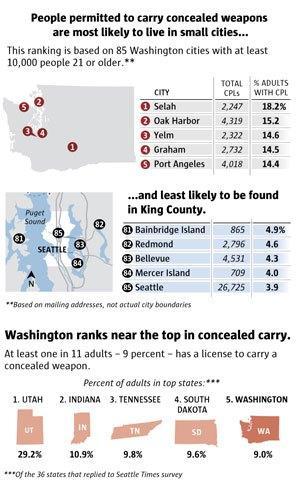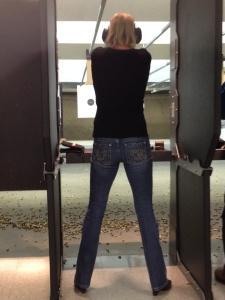
Graphic: Seattle Times
Seattle Times: For Katie Oittinen, a turning point was an afternoon two summers ago when a stranger walked into her living room. When he encountered Oittinen and her dog, a Great Dane mix, the man fled.
But what really scared Oittinen, who was pregnant, was what happened next: She called the police. They said they would come to her Portland home. And they never did.
So after her son was born and she and her husband moved to Granite Falls in Snohomish County, the 29-year-old new mom decided to get a license to carry a concealed handgun. “That was a wake-up call,” she said. “It’s things like that that make you wonder: ‘Who can you really rely on to protect you and your family?’ Pretty much yourself.”
Oittinen is part of a rush of Washington state residents — and especially women — who have obtained concealed-carry permits in record numbers.
Between 2005 and 2012, the number of state residents receiving new concealed-carry permits tripled to 62,939. Now some 451,000 Washington residents are allowed to carry a hidden handgun almost anywhere they go, more than 100,000 of them women.
Notably, the growth rate for women getting new permits is twice as fast as that of men.
What is going on?
Washington’s recent boom in concealed weapons mirrors a national trend, according to a Seattle Times analysis. State and national experts, law-enforcement officials and others, including permit holders themselves, offered different explanations for the concealed-carry explosion here.
But a common concern emerged from interviews with women who carry: the importance of self-defense.
That concern found an echo last month after a misogynistic gunman committed mass murder near the University of California, Santa Barbara, sparking a national conversation about women’s concerns about their safety.
Arkadi Gerney, senior fellow at the left-leaning Center for American Progress think tank, said concealed permits have ballooned nationwide because they are easier to get, thanks to new technologies and fewer pre-requirements such as training. “That drives more adoption,” Gerney said.
Washington is one of about 40 “shall-issue” states, meaning that law-enforcement agencies must issue the state’s “concealed-pistol license” (CPL) if minimum requirements are met. To get a license, an applicant must be 21 or older, undergo a criminal check and be fingerprinted. You are disqualified if you have a felony conviction, commitment for mental illness, dishonorable discharge from the armed services, illegal drug use within the past year, among other reasons. No firearms training is required.
Mitch Barker, executive director of the Washington Sheriffs and Police Chiefs Association, said that tragedies such as the mass slaying of schoolchildren in Newtown, Conn., have left people feeling helpless and in search of a way to protect themselves. “They think that if they have a CPL and they have a firearm … maybe they can do something,” he said.
After Newtown, gun owners in Seattle, King County and statewide did flood in with applications for concealed-weapon licenses. There were 3,439 permits issued by the King County Sheriff’s Office and Seattle Police Department in the three months after the tragedy. For the same period a year earlier, there were about half as many, 1,791.
Alan Gottlieb, founder of the Bellevue-based Second Amendment Foundation, said recent statements by President Obama about the importance of gun safety have triggered a run on permits out of fear of a looming crackdown. “Obama has been the gun salesman of the year,” he said.
In fact, gun rights have expanded since Obama took office while crime has gone down, said the Rev. Sandy Brown of First United Methodist Church, a member of a large coalition of faith leaders and public-health officials that supports background checks for all gun sales. He said the demand for permits is rising because Second Amendment groups have stirred fear in gun owners.
Washington’s rate for concealed weapons is now higher than almost any state. Of the 36 states that responded to Seattle Times records requests, Washington ranked fifth in permits per capita — above states such as Texas, Florida and Montana.
The sport of shooting
For Michelle Locke Hemby, the question was not why get a permit. It was why not. Hemby, 48, of Queen Anne, said she loves the sport of shooting and is well aware of the practical benefits of a permit, such as being able to avoid the waiting period to buy a handgun.
A facilities and corporate services manager, Hemby said she applied for a license in March after hearing rumors that the government might try to restrict permits. “I think it’s one of those things that because I can and because I enjoy the sport, it’s something I should take advantage of,” she said.
Hemby said women are probably getting permits more because they are becoming empowered to take control of their own safety.
She is something of an anomaly in her neighborhood. Her Queen Anne ZIP code has one of the lowest rates in Washington for concealed permits, 2.7 percent. The ZIP code for Seattle’s International District has the lowest rate, 1.9 percent. By contrast, the ZIP code for tiny Wilbur (in Lincoln County in Eastern Washington) has the highest rate, 22 percent.
Gracie McKee, 26, is a concealed license holder who came from a small town, in her case Brush Prairie, about 13 miles northeast of Vancouver, Wash. “The reason I carry is out of a deep-seated love for myself, my family and the innocents,” said McKee, now director of training and a range manager at West Coast Armory in Bellevue.
McKee knew by age 19 she wanted a concealed-weapon permit and after turning 21, she obtained one. She has since become an NRA training counselor, a certified instructor and a range-safety officer.
“I’d like to encourage women to explore any avenues, whether it be carrying concealed or something else, that will empower them to take on the survivor mindset and refuse to be a victim.”
Safety responsibility
Anette Wachter, a member of the U.S. National Rifle Team and a Belltown resident, secured her CPL three years ago. “I carry because I feel I am responsible for my own safety,” she said.
“The women I know who are getting their CPLs are women excited about shooting recreationally and the self-defense side comes second, as an added bonus,” she said. “Women are realizing they can do more to protect themselves. It’s a fun, interesting, daring and empowering thing to do … know you may be able to protect yourself gives you a bit more confidence that you don’t have to be a victim.
“I do feel everyone should have safe gun-handling training,” Wachter said. “But I don’t believe it should be a requirement to have training in order to buy a gun or have a CPL because of the fact that some women really may be in a dangerous situation and may need that protection.”
Phyllis Buckridge, 84, of Marysville is among the oldest women in the state with a license to carry a concealed weapon. She considers it a tool, one she used, beginning as a young adult, when hunting, hiking and “traipsing through the woods as a signaling device. I can’t yell very loud.” Today she doesn’t carry the weapon much. “At my stage in life, I’m not out rousting around,” Buckridge said. “I do know where it is in the house.”
Excellent news! And I concur with Wachter – training is a must and can more than likely help prepare you if you need to use your weapon for self defense.

Practice, practice, practice!
DCG

